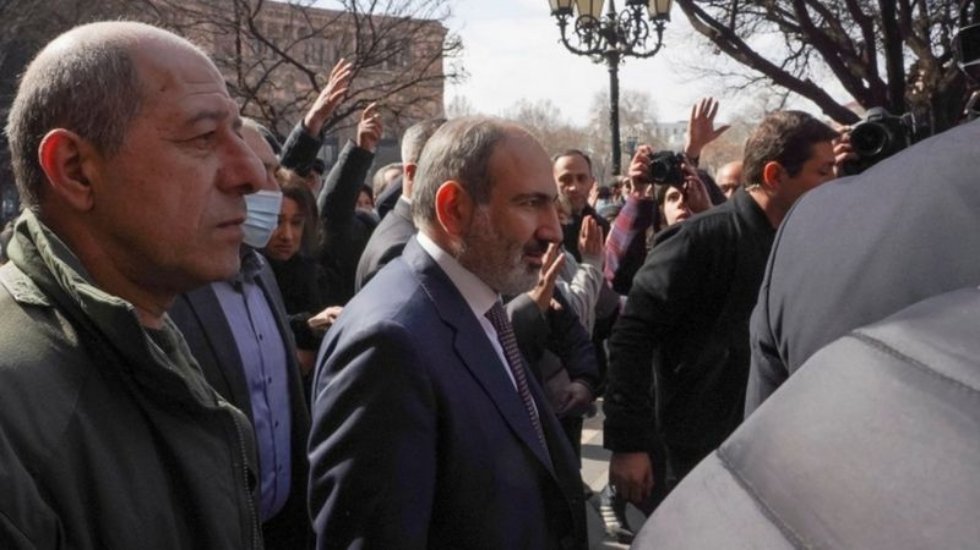Mohammad Reza Damavandi, in an interview with the website of the Strategic Council on Foreign Relations, referring to the recent political developments in Armenia following the defeat in the battle with the Republic of Azerbaijan and the citizens’ protests against the Prime Minister of that country, added: About three years ago, Pashinyan came to power with the slogan of fighting against corruption and drawing the support of the people, especially Armenians living around the world.
Referring to the actions and positions of the powers in connection with the recent tensions in Armenia, he said: It is true that Armenia was defeated in the war with the Republic of Azerbaijan and a number of people were killed, displaced and disappeared, which created a psychological atmosphere against Pashinyan, but it does not mean the inefficiency of his government and it is still acceptable.
High popularity of Pashinyan
The Caucasus researcher, meanwhile, said that despite the slight decline in Pashinyan’s popularity, he is still highly popular, adding: The demonstrations against Pashinyan in Yerevan are not crowded, and the oppositions who organize those demonstrations fail to bring large crowds to the streets, because the people of Armenia remember the corruption before Pashinyan and his actions against that corruption.
Referring to the differences and power struggles between the government and the opposition, which are backed by the army, Damavandi said: Pashinyan declared that they will not use force to seize power, because he himself came to power in a quiet revolution; the military does not have a smooth path to the coup, because they will face the reactions of the people.
He added: With the plan for early elections, Pashinyan wanted to send a message that he is sure he will remain in power. Of course, it remains to be seen how the other two sides of the tension, Russia and the United States, view this issue.
Russia and US not opposed to Pashinyan
He continued: It seems that Russia has no objection to the continuation of Pashinyan rule. The Americans have not shown any opposition at all. Therefore, it can be concluded that in the early elections, Pashinyan will regain the majority.
Damavandi underlined the need for Iran to pay attention to the situation in Armenia and its capabilities, adding: We must recognize the importance of the countries around us, especially the Caucasus. It cannot be denied that the Caucasus region, especially the South Caucasus, is a very important region and other countries pay enough attention to this region and give it a special place in their foreign policy.
Role of regional powers in Armenia
He pointed to the role of regional powers in Armenia, including Iran, Russia and Turkey, and said: Of course, we also see the role playing of some trans-regional countries such as the United States, France and Britain, which take this region into account in their calculations and each has interests in it. Interests that sometimes intersect.
Explaining the reasons for Armenia’s importance to the United States, including the pressure on Russia and the presence of a powerful Armenian lobby in the United States, the Caucasus researcher added: Britain has a historical presence in Armenia, given its view of energy and oil, especially oil pipelines of the Republic of Azerbaijan is following the developments in Armenia seriously and can play a role. In addition, the French have special calculations regarding Armenia due to the powerful Armenian lobby in their country.
Criticizing some analyzes in relation to Pashinyan’s pro-Western nature and lack of understanding of the country’s political developments, he said: Although Armenia is a very small country with a small population, it is in a geopolitical position, and this special situation has encouraged trans-regional powers to pay special attention to it and try to play a role in this region.
Damavandi added: The US Embassy in Armenia is one of the largest US embassies and raises the question of why the US has made such an investment to establish an embassy of that size in a very small country. China is also building a very large embassy in Yerevan; what is the relationship of a very small country with the superpower China and what is the reason that China is investing heavily in Armenia? All this shows the special position and importance of Armenia.
He continued by saying that we seem to be facing some historically stable and influential powers in Armenia who consider themselves competent in Armenia for various reasons, adding: One of those countries is Russia, which in any case considers Armenia part of its territory in the past and sees itself as having a role to play in establishing governments in that country, emphasizing that it has governments under its control, has a long-term military contract and a military base in Armenia.
He also referred to Turkey’s role playing in Armenia, as well as the historical differences between the two countries, adding: In recent months, some factions in Turkey have claimed that there is no such thing as Armenia, and that this is the territory of Eastern Turkey that must be liberated!
Emphasizing the need to pay attention to the role of China and India in Armenia, Damavandi said: China and India also have a special view on the South Caucasus region and Armenia. It should be noted that Pakistan does not recognize Armenia and has special relations with Azerbaijan, in order to strike a balance and by taking advantage of the capacity of the port of Chabahar, India is looking to Armenia and trying to expand its relations with that country. Given the above, the Islamic Republic of Iran, with regard to its geopolitical position and the nature of its relations with Armenia and other countries in the Caucasus region, should be able to consult and design careful plans and play a constructive role in resolving the crisis in the region in order to provide its interests in a desirable way.










0 Comments